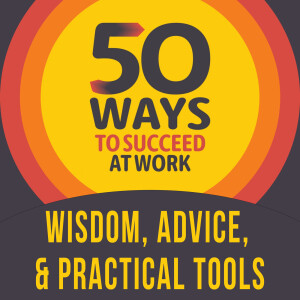
Around one in three people say they’ve been spoken to at work in an abusive way.
While you can report anything extreme, such as racial and sexual harassment, how do you rise above the more ordinary forms of criticism and come up smiling?
In this episode, says Andrew, there may be some situations at work when criticism will press all your buttons. That's when your mind switches to what’s called the reptilian brain. This is your survival mode.
It's your fight and flight reaction and it can be hard to master it on the spot. Even if you do what you usually know works such as taking a deep breath to steady your nerves. Now the danger is that you react badly too.
You may become angry, defensive and deaf to any further rational communication. Or you revert to child-like reactions such as becoming tearful and apologetic. Or perhaps a feeling of being helpless. Neither state does much good for your aim of being a success at work.
Andrew shows there are two practical ways of responding that return more control of the situation to you and how you feel inside. The first is to say nothing and listen.
You wait until the criticism downpour ends. Then you ask a simple question in a friendly or neutral way:
“What exactly is wrong? Can you be more specific? Please give me some examples of what concerns you.”
Use the person’s name and thank them for pointing out the apparent flaws in your work.
The other approach is to stay silent. This uses the power of silence and you can learn more about this from last week's episode 35: Silent Sentinel - using silence to make an impact at work
Depending on how serious the criticism you can choose to give the other person a long look and try to see them now, not as a supervisor, manager, boss or colleague.
Instead, you now view the person as playing the part of a critical parent. They are treating you as a child, which is disrespectful and potentially harmful to your future relationship.
Hurt pride may tempt you into making light of their complaint. You may begin replaying the conversation repeatedly in your mind. You wish that you’d said something different at the time. This only distracts you from the lesson you could learn from the experience.
Treat it as a gift if someone gives you the thumbs down about some work. No matter the form of the criticism, it seems that the person was interested enough to demand change and help you to grow. Had they wanted to harm you, they could have spotted y
Can't wait for Series 2 to run its course? Then buy Andrew's new book, published on Amazon, and there's also an Audio version.
Further reading and videos: Andrew recommends some useful follow-through material which you can find for each episode at
www.myhappinessatwork.com/reading/categories/research-reading
and
www.myhappinessatwork.com/watch.
BOOK:
The 50 Ways to Succeed at Work book is a standalone companion to Andrew Leigh's weekly podcasts.
It's an essential resource for all job starters and those at work for a few years.
Dip in and out and take what seems helpful.
www.myhappinessatwork.com/book
No comments yet. Be the first to say something!